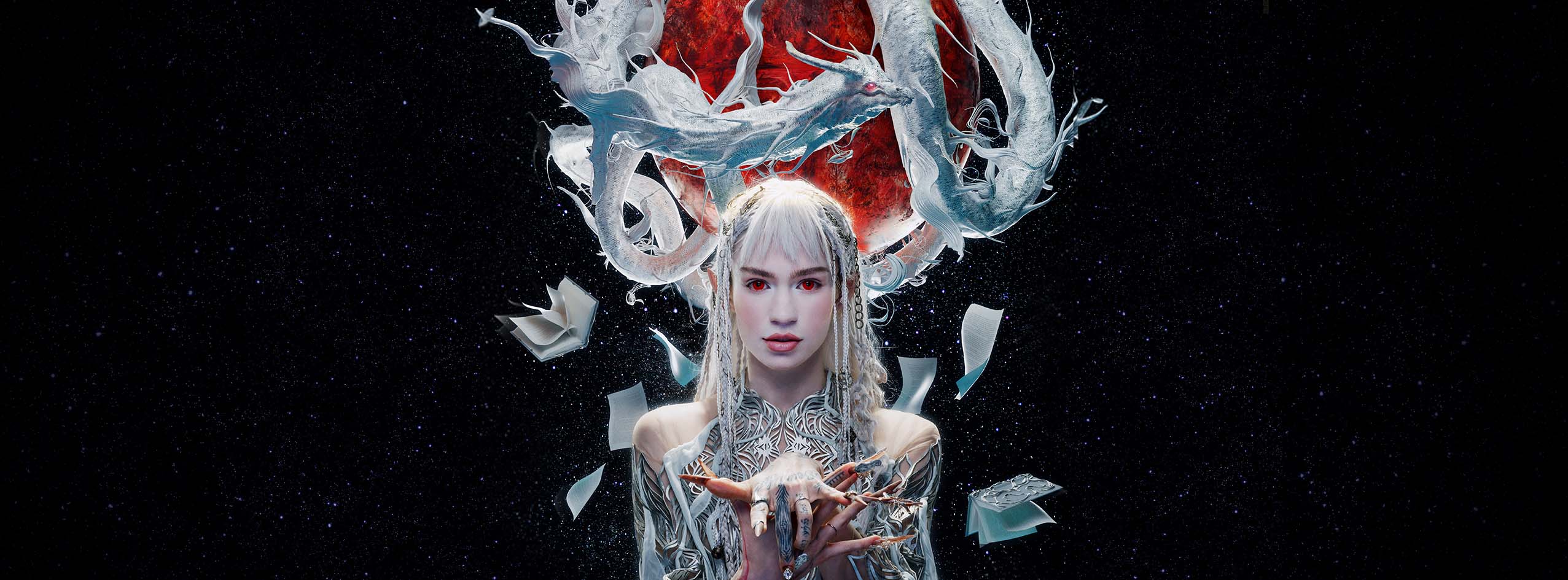
Sci&Tech Editor Sophie Webb introduces us to Grimes
According to Grimes’ artist bio on Spotify, the avant-garde Canadian singer-songwriter and music producer started playing around with electronic music when she was learning the programme Logic, as part of her neuroscience class at university. Shortly afterwards, she went viral as a musician on the early social media site Myspace. This enabled her to support herself by booking shows and playing raves, before releasing her first two albums Geidi Primes and Halfaxa on Arbutus Records, both in 2010. Her breakthrough came in 2012 with the album Visions, released on 4AD. Today, she has five acclaimed studio albums and over 6.1 million monthly listeners on Spotify – she has also accrued a position in mainstream media.
In terms of musical style, Grimes herself has described her work as “post-internet” – as seemingly belonging to a future age. Her dreamlike synth-pop sound has evolved over the years as she has aged and mastered her craft, yet it remains characteristically experimental. Her lyrics often explore themes of science fiction and feminism, constructing a futurist vision of a murky utopia or dystopia depending on the song, both of which are presided over by Grimes and her all-seeing presence.
Her dreamlike synth-pop sound has evolved over the years as she has aged and mastered her craft
‘Rosa’ from Geidi Primes
Grimes’ debut album from 2010 is her strangest and most otherworldly. ‘Rosa’ is simplistic, even repetitive – drawing you into a trance as it subtly builds to include echoing harmonies and celestial synthesisers. Spaced-out and alien, it immediately sets the tone for what would remain Grimes’ signature sound. Surreal lyrics such as “midnight afternoon” isolate it linguistically, setting it apart from our version of reality.
‘Genesis’ from Visions
The fast-paced opening track of Grimes’ breakthrough 2012 album involves her frantically reckoning with the chaos of falling in love. She crashes back and forth between “I never know” and “then I know”, between being in control and not being in control – lamenting the unpredictable nature of love and how it can be difficult to identify. Grimes spends the duration of the song trying to reason with her own “heart”, but upon its end, she declares: “I’m the one in love”.
‘Butterfly’ from Art Angels
Art Angels met critical acclaim upon its release, and was chosen by NME as the best album of 2015. Grimes used the album to explore avenues of more typical pop: ‘Butterfly’ makes use of her familiar eclectic arrangements, but to build a buoyant, girlish sound – distant from her subdued, alien first album, and yet familiar in the persistence of Grimes’ powerful, futuristic persona. Her lyrics are often cryptic and difficult to interpret, but here she appears to use imagery of flight (“butterflies flying in the air”) to celebrate romantic freedom: “I am not your dream girl…I’ll never be your dream girl”, she playfully insists.
Her lyrics are often cryptic and difficult to interpret
‘We Appreciate Power’ from Miss Anthropocene
Grimes cryptically describes 2020’s Miss Anthropocene as her “final Earth album”. This raging, violent anthem is peppered with sound effects of hammers slamming against concrete and animalistic screams. The song’s title could have a double meaning: while intended to acknowledge the rise of artificial intelligence and how it “appreciates power” (electricity), the lyric could also act as a call to arms for women to demand greater influence, given Grimes’ previous outspokenness on the experiences of women in the music industry.
Grimes’ Spotify bio, which is a truly wild passage of text, goes on to explain that she has recently had experimental eye surgery, and that she finds herself moving into “corporate surrealism”; exactly what this means is anyone’s guess. Regardless of what Grimes does next, we can only watch in disbelief.
Enjoyed this? You also might enjoy:
Album Review: Grimes – Miss Anthropocene
Comments